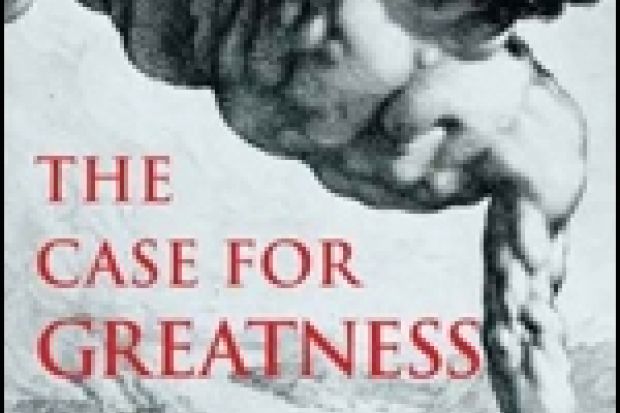Aristotle is lecturing in the Lyceum about what constitutes the nature of a great man. His pupils, among them Robert Faulkner, take notes. Suddenly, Aristotle breaks off. "There!" he says, pointing to three men in togas. Faulkner adjusts his spectacles and sees Washington, Lincoln - and who? He squints. Ah, Churchill, identifiable by his cigar. Washington's teeth shine bright: marble, not wood. It is an inspiring scene. "There!" declares Aristotle. "They are great men!" It is hot and Faulkner wants to loosen his collar a little, but instead reverently takes up his ballpoint pen and makes a list. "Great men: Washington, Lincoln, Churchill ... ".
Faulkner's list of politicians is of those with megalopsuchia, "greatness of soul": not the politicians of recent vintage who seem to be capable only of being quoted in their expletives, but the old-fashioned defenders of liberty, truth, the constitution and so on. Politicians who were great and good because they said what they meant and meant what they said: figures, apparently, like Mandela, Bevin, Pitt the Elder, Reagan and Thatcher. And what Faulkner wants is a "case" for greatness that will enable us to honour such megapsychians.
The problem is that one can't state a case for greatness. It is like stating a case for beauty, or for ugliness: a silly, magazine, sort of activity. But Faulkner proceeds nonetheless, although by indirection, dealing not with greatness itself but with what certain writers have said about it. He first admires Aristotle and other ancients who succeed, as it were, in seeing Washington's greatness for what it is, and then dismisses Arendt and Rawls (too egalitarian) and Machiavelli, Hobbes and Nietzsche (too antinomian) for failing to do so. His "case" for greatness depends on Aristotle's habit of talking about hypothetical entities (like "great men") as if they exist. And that is, a bit irritatingly, it.
It is not clear what Faulkner wants. He may want, controversially, to defend an objective historical pantheon of greats; or he may want, more controversially, to advocate an ideal of a static society of men arranged in classes (possibly gold, silver and bronze), with reverence flowing upwards and benevolence flowing downwards. If he wants neither, then his book is merely a trivial encouragement to respect certain "great" figures more.
Either Faulkner's book is trivial, or it is reactionary. There is nothing wrong with reaction, in principle; any more than there is with conservation, reform or revolution, in principle. But if his aim is reactionary, rather than merely trivial, he fails to see that reaction requires justification, and that a case against antinomianism and egalitarianism has to be infinitely subtler than anything of which he seems capable, judging by this book.
The Case for Greatness is worthy, learned and so on. There is something to be said for an opposition to relativism, an avoidance of jargon and an attempt to justify a high-toned politics. But Faulkner's enemies - the egalitarians and antinomians - will laugh at this book. It is one of the most old-fashioned books I have ever seen. It is perhaps a final efflorescence of the dull, dignified, self-deceived, hierarchical tradition of republican American politics. It would make a good set of lectures for lower-ranking civil servants; but it is, emphatically, not a book, not a case, and not even amusing. No amount of whitewash will paint over Machiavelli, Hobbes or Nietzsche - or make the White House into the Parthenon.
The Case for Greatness: Honorable Ambition and Its Critics
By Robert Faulkner
Yale University Press
288pp
£20.00
ISBN 9780300123937
Published 11 January 2008
Register to continue
Why register?
- Registration is free and only takes a moment
- Once registered, you can read 3 articles a month
- Sign up for our newsletter
Subscribe
Or subscribe for unlimited access to:
- Unlimited access to news, views, insights & reviews
- Digital editions
- Digital access to THE’s university and college rankings analysis
Already registered or a current subscriber? Login




